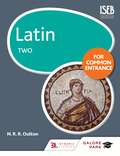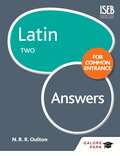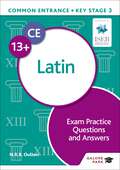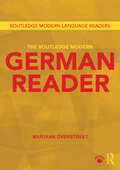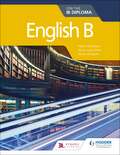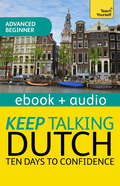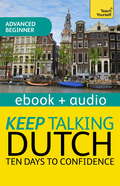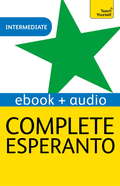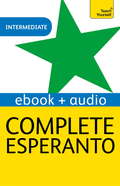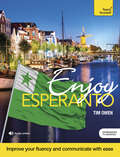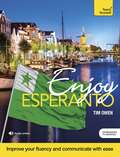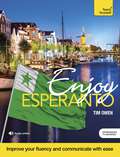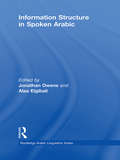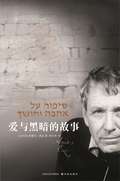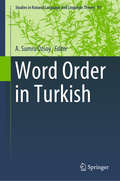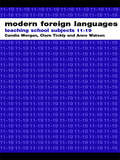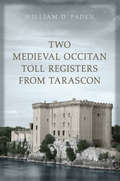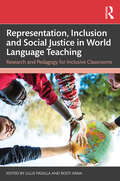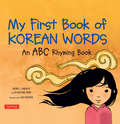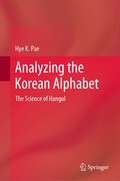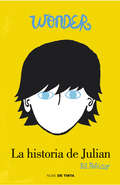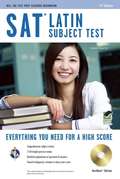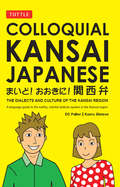- Table View
- List View
Latin for Common Entrance Two
by N. R. OultonExam Board: ISEBLevel: 13+Subject: LatinFirst Teaching: September 2014First Exam: Autumn 2015Latin for Common Entrance Two is the second book in Nicholas Oulton's new Latin course, combining your favourite elements of So You Really Want to Learn Latin, Latin Prep and Ab Initio, but now it maps precisely to the new ISEB syllabus and contains passages and question types in line with the revised Common Entrance exam.Following on from Book One, this extensively revised book takes pupils through the future and pluperfect tenses, 3rd declension nouns and adjectives, personal and demonstrative pronouns, the comparison of adjectives and irregular verbs. All the grammar, vocabulary and syntax on the Level 2 syllabus is covered and it also covers a substantial portion of the non-linguistic studies part of the ISEB syllabus in the areas of Greek mythology, Domestic Life and the City of Rome.Written specifically for prep schools, this book includes solid grammar explanations, intentionally challenging content and twice as many practice exercises compared to the previous series, ensuring pupils have understood the material covered. Latin for Common Entrance Two Answers are available to buy separately as a PDF download.
Latin for Common Entrance Two Answers
by N. R. OultonThis PDF download provides a complete set of answers to the exercises in Latin for Common Entrance Two.- Clear layout saves time marking work - Enables efficient assessment of pupils' strengths and weaknesses - Advice and guidance develops pupils' use of the languagePlease note that as a PDF download, this product is non-refundable.
Common Entrance 13+ Latin Exam Practice Questions and Answers
by N. R. Oulton Bob BassExam board: ISEB Level: 13+ CE and KS3 Subject: Latin First exams: November 2022Improve exam technique and build confidence to ensure success in the CE 13+ Latin exams with these practice questions in the style of the ISEB exams.· Covers all levels: prepare for the Level 1, Level 2, and Level 3 papers.· Achieve top marks in all areas: practise a range of questions covering translation, grammar, and vocabulary both from English to Latin and Latin to English.· Improve exam results: exam-style questions and answers included to help identify any gaps in knowledge and skill. Pair with Common Entrance 13+ Latin Revision Guide for comprehensive exam preparation (ISBN: 9781398351981).
Common Entrance 13+ Latin Exam Practice Questions and Answers
by N. R. Oulton Bob BassExam board: ISEB Level: 13+ CE and KS3 Subject: Latin First exams: November 2022Improve exam technique and build confidence to ensure success in the CE 13+ Latin exams with these practice questions in the style of the ISEB exams.· Covers all levels: prepare for the Level 1, Level 2, and Level 3 papers.· Achieve top marks in all areas: practise a range of questions covering translation, grammar, and vocabulary both from English to Latin and Latin to English.· Improve exam results: exam-style questions and answers included to help identify any gaps in knowledge and skill. Pair with Common Entrance 13+ Latin Revision Guide for comprehensive exam preparation (ISBN: 9781398351981).
The Routledge Modern German Reader (Routledge Modern Language Readers)
by Maryann OverstreetThe Routledge Modern German Reader is designed for intermediate and advanced learners of German. It provides a clear and engaging introduction to reading authentic German language texts for learners who wish to move beyond elementary course material to more rewarding works of fiction and non-fiction.Features include: twenty-eight readings, graded according to difficulty, beginning with shorter, simpler texts and progressing to longer, more complex texts fourteen literary texts, written by well-known writers from German-speaking countries, on universal themes and fourteen non-literary texts from magazines, newspapers and the internet, featuring a range of engaging topics relating to culture, society and history varied, contextualized pre- and post- reading exercises designed to stimulate discussion, develop comprehension strategies, expand and refine vocabulary, and foster awareness of grammatical structures as they occur in authentic contexts a German-English glossary with separate vocabulary lists for each chapter and a complete answer key available at www.routledge.com/products/9781138898035 Suitable for both classroom use and independent study, The Routledge Modern German Reader provides insights into the culture of German-speaking countries while also acting as a stimulus to further independent reading. It is an essential tool for developing vocabulary and increasing reading proficiency.
English B for the IB Diploma
by Hyun Jung Owen Mark McGowan Aaron DeupreeExam board: International BaccalaureateLevel: IB DiplomaSubject: EnglishFirst teaching: September 2019First exams: Summer 2021Develop competent communicators who can demonstrate a sound conceptual understanding of the language with a flexible course that ensures thorough coverage of the updated English B Guide and is designed to meet the needs of all IB students at Standard and Higher Level.- Empower students to communicate confidently by exploring the five prescribed themes through authentic texts and skills practice at the right level, delivered in clear learning pathways. - Ensure students are able to produce coherent written texts and deliver proficient presentations with grammar and vocabulary introduced in context and in relation to appropriate spoken and written registers. - Improve receptive skills with authentic written texts, audio recordings spoken at a natural pace, and carefully crafted reading and listening tasks.- Promote global citizenship, intercultural understanding and an appreciation of English cultures through a wide range of text types and cultural material from around the world. - Deliver effective practice with a range of structured tasks within each unit that build reading, listening, speaking and writing skills.- Establish meaningful links to TOK and CAS, and identify learner profile attributes in action.The audio for the Student Book is FREE to download from www.hoddereducation.com/ibextras
English B for the IB Diploma
by Hyun Jung Owen Mark McGowan Aaron DeupreeExam board: International BaccalaureateLevel: IB DiplomaSubject: EnglishFirst teaching: September 2019First exams: Summer 2021Develop competent communicators who can demonstrate a sound conceptual understanding of the language with a flexible course that ensures thorough coverage of the updated English B Guide and is designed to meet the needs of all IB students at Standard and Higher Level.- Empower students to communicate confidently by exploring the five prescribed themes through authentic texts and skills practice at the right level, delivered in clear learning pathways. - Ensure students are able to produce coherent written texts and deliver proficient presentations with grammar and vocabulary introduced in context and in relation to appropriate spoken and written registers. - Improve receptive skills with authentic written texts, audio recordings spoken at a natural pace, and carefully crafted reading and listening tasks.- Promote global citizenship, intercultural understanding and an appreciation of English cultures through a wide range of text types and cultural material from around the world. - Deliver effective practice with a range of structured tasks within each unit that build reading, listening, speaking and writing skills.- Establish meaningful links to TOK and CAS, and identify learner profile attributes in action.The audio for the Student Book is FREE to download from www.hoddereducation.com/ibextras
Keep Talking Dutch Audio Course - Ten Days to Confidence: Audio eBook
by Marleen OwenIf you already have the basics and want to learn more Dutch, this advanced beginner audio course will boost your confidence to understand and speak Dutch.Practise the most frequent words and expressions for:-booking a room-booking a restaurant-visiting a museum-going on a canal trip-ordering an Indonesian meal-talking about Dutch food-getting directions to the museum-finding out where the Stopera is-talking about learning Dutch-talking about work.You'll progress in your understanding by working out language patterns for yourself, personalise your Dutch with interactive role-plays and perfect your pronunciation to sound more natural.Keep Talking Dutch - Ten Days to Confidence maps to A1 of the Common European Framework of Reference (CEFR) for languages.Rely on Teach Yourself, trusted by language learners for over 75 years.
Keep Talking Dutch Audio Course - Ten Days to Confidence: Audio eBook
by Marleen OwenIf you already have the basics and want to learn more Dutch, this advanced beginner audio course will boost your confidence to understand and speak Dutch.Practise the most frequent words and expressions for:-booking a room-booking a restaurant-visiting a museum-going on a canal trip-ordering an Indonesian meal-talking about Dutch food-getting directions to the museum-finding out where the Stopera is-talking about learning Dutch-talking about work.You'll progress in your understanding by working out language patterns for yourself, personalise your Dutch with interactive role-plays and perfect your pronunciation to sound more natural.Keep Talking Dutch - Ten Days to Confidence maps to A1 of the Common European Framework of Reference (CEFR) for languages.Rely on Teach Yourself, trusted by language learners for over 75 years.
Complete Esperanto: Learn to read, write, speak and understand Esperanto
by Tim OwenDo you want to develop a solid understanding of Esperanto and communicate confidently with others?Through authentic conversations, vocabulary building, grammar explanations, and extensive practice and review, Complete Esperanto will equip you with the practical skills you need to use modern Esperanto in a variety of realistic settings and situations, developing your cultural awareness along the way.What will I achieve by the end of the course?By the end of Complete Esperanto you will have a solid intermediate-level grounding in the four key skills - reading, writing, speaking, and listening - and be able to communicate with confidence and accuracy. Is this course for me?If you want to move confidently from beginner to intermediate level, this is the course for you. It's perfect for the self-study learner, with a one-on-one tutor, or for the beginner classroom. It can also be used as a refresher course. What do I get?-18 learning units plus verbs reference and word glossary and revision section-Discovery Method - figure out rules and patterns to make the language stick -Teaches the key skills - reading, writing, listening, and speaking -Learn to learn - tips and skills on how to be a better language learner -Culture notes - learn about modern Esperanto culture -Outcome-based learning - focus your studies with clear aims -Authentic listening activities - everyday conversations give you a flavor of real spoken Esperanto-Test Yourself - see and track your own progress *Complete Esperanto maps from Novice Low to Advanced Low level proficiency of ACTFL (American Council on the Teaching of Foreign Languages) and from A1 Beginner to B1/B2 Upper Intermediate level of the CEFR (Common European Framework of Reference for Languages) guidelines. Please note not all devices support the audio/video component of enhanced ebooks. We recommend you download a sample to check compatibility with your device. Alternatively, you can find the audio for this course for free on our website https://library.teachyourself.com. You will be able to stream it online or download it to the Teach Yourself Library app.Rely on Teach Yourself, trusted by language learners for over 80 years.
Complete Esperanto: Learn to read, write, speak and understand Esperanto
by Tim OwenDo you want to develop a solid understanding of Esperanto and communicate confidently with others?Through authentic conversations, vocabulary building, grammar explanations, and extensive practice and review, Complete Esperanto will equip you with the practical skills you need to use modern Esperanto in a variety of realistic settings and situations, developing your cultural awareness along the way.What will I achieve by the end of the course?By the end of Complete Esperanto you will have a solid intermediate-level grounding in the four key skills - reading, writing, speaking, and listening - and be able to communicate with confidence and accuracy. Is this course for me?If you want to move confidently from beginner to intermediate level, this is the course for you. It's perfect for the self-study learner, with a one-on-one tutor, or for the beginner classroom. It can also be used as a refresher course. What do I get?-18 learning units plus verbs reference and word glossary and revision section-Discovery Method - figure out rules and patterns to make the language stick -Teaches the key skills - reading, writing, listening, and speaking -Learn to learn - tips and skills on how to be a better language learner -Culture notes - learn about modern Esperanto culture -Outcome-based learning - focus your studies with clear aims -Authentic listening activities - everyday conversations give you a flavor of real spoken Esperanto-Test Yourself - see and track your own progress *Complete Esperanto maps from Novice Low to Advanced Low level proficiency of ACTFL (American Council on the Teaching of Foreign Languages) and from A1 Beginner to B1/B2 Upper Intermediate level of the CEFR (Common European Framework of Reference for Languages) guidelines. Please note not all devices support the audio/video component of enhanced ebooks. We recommend you download a sample to check compatibility with your device. Alternatively, you can find the audio for this course for free on our website https://library.teachyourself.com. You will be able to stream it online or download it to the Teach Yourself Library app.Rely on Teach Yourself, trusted by language learners for over 75 years.
Enjoy Esperanto
by Tim OwenEnjoy Esperanto introduces you to the more advanced points of Esperanto grammar and develops your vocabulary through a variety of engaging and contemporary themes, giving you the skills you need to respond to a wide range of authentic texts and conversations.What will I achieve by the end of the course?By the end of Enjoy Esperanto you will have increased your capacity to understand the spoken and written language, and furthered your ability to communicate with Esperanto speakers, orally and in writing. This course aims to take you from a good intermediate level (B1/B2 on the Common European Framework of Reference for languages / Advanced Low of the ACTFL) and help you progress up to a C1 / Advanced High level. Is this course for me?If you already know some Esperanto and want to take it further, this is the course for you. It's perfect for the self-study learner, with a one-to-one tutor, or for the post-beginner classroom.What do I get?A coursebook with over two hours of audio online that features:- Ten units that cover more complex situations than your basic tourist scenarios- Carefully levelled and sequenced material - a solid path to build up your knowledge- Insight into Esperanto culture- Authentic texts, such as newspaper articles, blogs, poems, songs, excerpts and conversations to present the language- Learn through the Discovery Method which helps you notice patterns and retain the language you learn- Learn to learn - tips and advice on becoming a better language learner- Easy to use workbook format.What else can I use to learn Esperanto?If you want a comprehensive beginner to intermediate course, you should try our Complete Esperanto.Rely on Teach Yourself, trusted by language learners for over 80 years.
Enjoy Esperanto Intermediate to Upper Intermediate Course: Improve your fluency and communicate with ease
by Tim OwenEnjoy Esperanto introduces you to the more advanced points of Esperanto grammar and develops your vocabulary through a variety of engaging and contemporary themes, giving you the skills you need to respond to a wide range of authentic texts and conversations.What will I achieve by the end of the course?By the end of Enjoy Esperanto you will have increased your capacity to understand the spoken and written language, and furthered your ability to communicate with Esperanto speakers, orally and in writing. This course aims to take you from a good intermediate level (B1/B2 on the Common European Framework of Reference for languages / Advanced Low of the ACTFL) and help you progress up to a C1 / Advanced High level. Is this course for me?If you already know some Esperanto and want to take it further, this is the course for you. It's perfect for the self-study learner, with a one-to-one tutor, or for the post-beginner classroom.What do I get?A coursebook with over two hours of audio online that features:- Ten units that cover more complex situations than your basic tourist scenarios- Carefully levelled and sequenced material - a solid path to build up your knowledge- Insight into Esperanto culture- Authentic texts, such as newspaper articles, blogs, poems, songs, excerpts and conversations to present the language- Learn through the Discovery Method which helps you notice patterns and retain the language you learn- Learn to learn - tips and advice on becoming a better language learner- Easy to use workbook format.What else can I use to learn Esperanto?If you want a comprehensive beginner to intermediate course, you should try our Complete Esperanto.Rely on Teach Yourself, trusted by language learners for over 80 years.
Enjoy Esperanto Intermediate to Upper Intermediate Course: Improve your fluency and communicate with ease
by Tim OwenEnjoy Esperanto introduces you to the more advanced points of Esperanto grammar and develops your vocabulary through a variety of engaging and contemporary themes, giving you the skills you need to respond to a wide range of authentic texts and conversations.What will I achieve by the end of the course?By the end of Enjoy Esperanto you will have increased your capacity to understand the spoken and written language, and furthered your ability to communicate with Esperanto speakers, orally and in writing. This course aims to take you from a good intermediate level (B1/B2 on the Common European Framework of Reference for languages / Advanced Low of the ACTFL) and help you progress up to a C1 / Advanced High level. Is this course for me?If you already know some Esperanto and want to take it further, this is the course for you. It's perfect for the self-study learner, with a one-to-one tutor, or for the post-beginner classroom.What do I get?A coursebook with over two hours of audio online that features:- Ten units that cover more complex situations than your basic tourist scenarios- Carefully levelled and sequenced material - a solid path to build up your knowledge- Insight into Esperanto culture- Authentic texts, such as newspaper articles, blogs, poems, songs, excerpts and conversations to present the language- Learn through the Discovery Method which helps you notice patterns and retain the language you learn- Learn to learn - tips and advice on becoming a better language learner- Easy to use workbook format.What else can I use to learn Esperanto?If you want a comprehensive beginner to intermediate course, you should try our Complete Esperanto.Rely on Teach Yourself, trusted by language learners for over 80 years.
Information Structure in Spoken Arabic (Routledge Arabic Linguistics Series)
by Jonathan OwensThis book explores speakers’ intentions, and the structural and pragmatic resources they employ, in spoken Arabic – which is different in many essential respects from literary Arabic. Based on new empirical findings from across the Arabic world this book elucidates the many ways in which context and the goals and intentions of the speaker inform and constrain linguistic structure in spoken Arabic. This is the first book to provide an in-depth analysis of information structure in spoken Arabic, which is based on language as it is actually used, not on normatively-given grammar. Written by leading experts in Arabic linguistics, the studies evaluate the ways in which relevant parts of a message in spoken Arabic are encoded, highlighted or obscured. It covers a broad range of issues from across the Arabic-speaking world, including the discourse-sensitive properties of word order variation, the use of intonation for information focussing, the differential role of native Arabic and second languages to encode information in a codeswitching context, and the need for cultural contextualization to understand the role of "disinformation" structure. The studies combine a strong empirical basis with methodological and theoretical issues drawn from a number of different perspectives including pragmatic theory, language contact, instrumental prosodic analysis and (de-)grammaticalization theory. The introductory chapter embeds the project within the deeper Arabic grammatical tradition, as elaborated by the eleventh century grammarian Abdul Qahir al-Jurjani. This book provides an invaluable comprehensive introduction to an important, yet understudied, component of spoken Arabic.
A Tale Of Love And Darkness (Mandarin Edition)
by Amos OzIt is the story of a boy growing up in the war-torn Jerusalem of the forties and fifties, in a small apartment crowded with books in twelve languages and relatives speaking nearly as many. 爱与黑暗的故事 是当今以色列最富影响力的作家阿摩司·奥兹的自传体长篇小说 一向被学界视为奥兹最优秀的作品 短短五年 便翻译成二十多种文字 曾夺得2005年"歌德文化奖" 2007年入围"国际布克奖" 小说以耶路撒冷做为主要背景 以娓娓动人的笔法向读者展示出百余年一个犹太家族的故事与民族历史 既带你走进一个犹太家庭 了解其喜怒哀乐 又使你走近一个民族 窥见其得失荣辱
Word Order in Turkish (Studies in Natural Language and Linguistic Theory #97)
by A. Sumru ÖzsoyThis volume is a collection of studies on various aspects of word order variation in Turkish. As a head-final, left-branching ‘free’ word order language, Turkish raises a number of significant theory-internal as well as language-particular questions regarding linearization in language. Each of the contributions in the present volume offers a fresh insight into a number of these questions, thus, while expanding our knowledge of the language-particular properties of the word order phenomena, also contribute individually to the theory of linearization in general. Turkish is a configurational language. It licenses constructions in which constituents can occur in non-canonical presubject as well as postverbal positions. Presented within the assumptions of the generative tradition, the discussion and analyses of the various aspects of the linearization facts of the language offer a novel treatment of the issues therein. The authors approach the word order phenomena from a variety of perspectives, ranging from purely syntactic treatments, to accounts as syntax-PF interface or syntax-discourse interface phenomena or as output of base generation.
Modern Foreign Languages: Teaching School Subjects 11-19 (Teaching School Subjects 11-19)
by Norbert Pachler Michael Evans Shirley LawesCovering the training standards for NQTs and the Induction Standards and also fully exploring issues to do with subject knowledge in learning to teach, this is the essential guide for teachers of foreign languages. Acknowledging that an essential element of a secondary teacher's identity is tied up with their subject taught, the book is divided into three sections: framing the subject teaching the subject modern languages within the professional community. This book aims to provide stimulating assistance to subject specialists by helping them find ways of thinking about their specialism, how to teach with it, and how to enagage with what pupils learn through it. Written with teachers of modern foreign languages in the years of their early professional development in mind, this book is also suitable for those on PGCE courses, those in their induction year, and those in years two and three of their teaching career.
Two Medieval Occitan Toll Registers from Tarascon
by William D. PadenTwo Medieval Toll Registers from Tarascon presents an edition, translation, and discussion of two vernacular toll registers from fourteenth and fifteenth-century Provence. These two registers are a valuable new source for the economic, linguistic, and transportation history of medieval France, offering a window onto the commercial life of Tarascon, a fortified town on the east bank of the Rhône between Avignon and Arles. William D. Paden discusses the developing fiscal policy of the counts of Provence, for whom the tolls were collected, and the practice and vocabulary of medieval toll-keeping. An afterword considers the toll registers in relation to the poetry of troubadours, arguing that the realism of the registers and the idealism of troubadour poetry overlapped in the world of medieval Tarascon.
Representation, Inclusion and Social Justice in World Language Teaching: Research and Pedagogy for Inclusive Classrooms
by Lillie Padilla Rosti VanaThis volume introduces teaching methodologies for improving and incorporating representation, inclusion and social justice perspectives in the world language curriculum. Chapters present state-of-the-art research and cover many different language contexts, including French, Spanish, Mandarin, and Portuguese. Authors discuss difficult and hot topics, such as Critical Language Awareness, Critical Race Theory, non-binary language use in gendered languages, culturally sustaining curriculum, teaching heritage language speakers, and more. Ideal for graduate courses, students, and scholars in world language education, the volume offers new pathways and strategies for promoting diversity and equity in the classroom.
My First Book of Korean Words: An ABC Rhyming Book
by Aya Padron Kyubyong Park Henry J. AmenMy First Book of Korean Words is a beautifully illustrated book that introduces young children to Korean language and culture through everyday words.The words profiled in this book are all commonly used in the Korean language and are both informative and fun for English-speaking children to learn. The goals of My First Book of Korean Words are multiple: to familiarize children with the sounds and structure of Korean speech; to introduce core elements of Korean culture; to illustrate the ways in which languages differ in their treatment of everyday sounds; and to show how, through cultural importation, a single word can be shared between languages.Both teachers and parents will welcome the book's cultural and linguistic notes, and appreciate how the book is organized in a familiar ABC structure. Each word is presented in Hangeul, as well as in its Romanized form.With the help of this book, we hope more children (and adults) will soon be a part of the nearly 80 million people worldwide that speak Korean!
Analyzing the Korean Alphabet: The Science of Hangul
by Hye K. PaeThis book provides comprehensive coverage of the Korean alphabet, Hangul, and includes a synthesis of research findings relating to reading in the non-Roman alphabet. This, in turn, contributes to the science of reading through an understanding of reading mechanisms that are essential for all writing systems, and that are particular for a given writing system. Hangul has been recognized as “the world’s best alphabet,” “one of the great intellectual achievements of Mankind,” and “alphabet’s epitome, a star among alphabets” by international linguists and historians. It is known that writing systems have evolved based on the ecological principle that visual signs are culturally selected to match objects found in natural scenes through selection pressures for optimal visual processing. However, Hangul is an exception. It was purposely invented by King Sejong in the 15th century to combat the illiteracy prevalent at the time. The chapters excavate the historical background of Hangul, and the unique characteristics of Hangul that contribute to learnability for emergent readers and efficiency for skilled readers. The author presents empirical evidence of psycholinguistic research into reading Hangul, building theories and presenting implications for the science of reading (psycholinguistics) and the science of writing (grapholinguistics). This book is relevant to students, researchers, and practitioners in applied linguistics, psycholinguistics, language studies, reading studies, and grammatology, with a particular focus on the Korean alphabet.
Wonder. La historia de Julian
by R. J. PalacioWonder. La lección de August ha recordado a miles de lectores la importancia de ser amable. Pero este no es un libro sobre August, un niño que quiere ser normal a pesar de su aspecto, sino sobre Julian. ¿Qué motivos tiene Julian para odiar a August?¿Será capaz de asumir sus errores y empezar de nuevo? Wonder. La historia de Julian trata sobre el niño que peor se porta con Auggie. No soporta verlo, no soporta que sea amigo de Jack, no soporta que esté en su colegio... y no es capaz de darse cuenta del impacto que sus actos pueden tener en los demás. Provocadora, sorprendente y emotiva, Wonder. La historia de Julian deleitará a los lectores de Wonder. La lección de August... y a los que todavía no la han leído.
Latin (SAT PSAT ACT (College Admission) Prep Series)
by Ronald B. Palma<P>Taking the SAT Latin Subject Test? <P>Then REA's SAT Subject Test: Latin Test Prep with Practice Tests on CD is just for you! <P>Written by an experienced Latin teacher, this second edition of our bestselling SAT Subject Test: Latin test prep includes a comprehensive review of covers all language areas appearing on the actual exam including coverage of declensions, conjugations, sentence structure, and more. Each chapter contains numerous examples and practice questions, and tips that help students study smarter and boost their test scores. <P>The book includes two full-length practice tests that replicate the actual exam's question format. Both of the book's practice exams are featured on our TestWare CD with the most powerful scoring and diagnostic tools available today. Automatic scoring and instant reports help you zero in on the topics and types of questions that give you trouble now, so you'll succeed when it counts. <P>Detailed explanations of answers help you identify your strengths and weaknesses. We don't just say which answers are right - we also explain why the other answer choices are incorrect - so you'll be prepared on test day. <P>The book also includes study tips, strategies, and confidence-boosting advice you need for test day. <P>REA's test prep is a must for any high school student taking the SAT Latin Subject Test!
Colloquial Kansai Japanese
by D. C. Palter Kaoru SlotsveThis is a compact and convenient guide to learning the Kansai dialect of the Japanese languageMaido, maido and welcome to the Kansai region of western Japan. Whether visiting or living in this area, you will quickly notice the locals aren't speaking standard Japanese taught in textbooks and classrooms. The language on the streets is Kansai-ben: a dialect said to be earthier and more direct, but with its own polite langauge.With clear explanations of grammar, a Kansai-ben dictionary, and a helpful index, Colloquial Kansai Japanese is an indispensable guide to the rich speech of Kyoto, Osaka and Kobe. Hundreds of sample phrases, sentences and conversations show how the dialect works in everyday situations, ranging from shopping to dealing with the boss. And while you're leaning about the nuances of Kansai-ben, you will have fun reading about Kansai cuisine, sports and specialities.So open your mouth when you speak, roll your r's, and try out this colorful dialect. With your copy of Colloquial Kansai Japanese, you will soon be among friends in Kansai.
